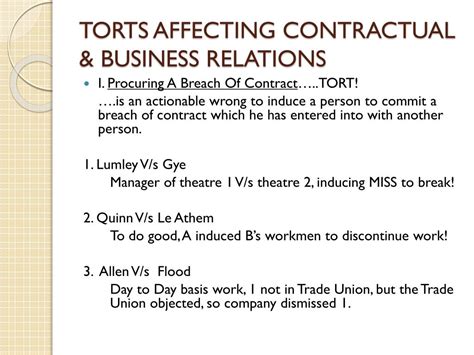How Do Torts Affect Business Practices
Ronan Farrow
Apr 04, 2025 · 3 min read

Table of Contents
How Torts Affect Business Practices
Understanding torts is crucial for any business owner. A tort is a civil wrong that unfairly causes someone else to suffer loss or harm resulting in legal liability for the person who commits the tortious act. This can significantly impact a business's operations, profitability, and reputation. Let's explore the various ways torts affect business practices.
Types of Torts Affecting Businesses
Businesses can be held liable for a range of torts, broadly categorized into:
Intentional Torts
These involve deliberate actions causing harm. Examples relevant to businesses include:
- Fraud: Intentionally misrepresenting facts to induce another party into a business deal, leading to financial losses. This could involve misleading advertising or deceptive sales practices. Penalties can be severe, including hefty fines and reputational damage.
- Defamation (Libel and Slander): Making false statements that harm someone's reputation. For businesses, this might involve negative reviews or false accusations made against competitors. Protecting your business from defamation lawsuits involves careful communication and a robust public relations strategy.
- Trespassing: Unauthorized entry onto someone's property. This could include employees entering a competitor's premises or customers trespassing on private business property. Clear signage and security measures can help mitigate the risk.
- Tortious Interference: Interfering with a contract or business relationship between two parties. This could involve attempting to steal a client or poaching employees. Strong contracts and non-compete agreements are essential protective measures.
Negligence Torts
These involve a failure to exercise the standard of care a reasonable person would exercise in a similar situation, resulting in harm. Business examples:
- Product Liability: A business is liable for injuries caused by defective products. This is a major concern for manufacturers, distributors, and retailers. Rigorous quality control and adherence to safety standards are paramount.
- Premises Liability: Businesses are responsible for ensuring their premises are safe for visitors. This includes addressing hazards that could lead to slips, trips, or falls. Regular safety inspections and prompt remediation of hazards are vital.
- Negligent Misrepresentation: Providing inaccurate information that leads to another party's financial loss. This could involve providing faulty business advice or making incorrect statements in marketing materials. Accurate and verifiable information is crucial.
Minimizing Tort Liability
Businesses can take several steps to minimize their exposure to tort liability:
- Comprehensive Insurance: Maintaining adequate liability insurance is crucial to protect against financial losses resulting from tort claims.
- Robust Compliance Programs: Implementing strong internal controls and compliance programs can help prevent negligence and intentional torts.
- Regular Training: Training employees on legal and ethical business practices can reduce the likelihood of tortious conduct.
- Thorough Risk Assessments: Regularly assess potential risks and implement measures to mitigate those risks.
- Effective Documentation: Maintaining thorough documentation of business practices and transactions can help defend against tort claims.
The Impact on Business Operations
The consequences of tort liability can be significant. Beyond the financial penalties (fines, settlements, and legal fees), a business can suffer:
- Reputational Damage: Negative publicity associated with a tort lawsuit can severely damage a business's reputation and brand image.
- Loss of Customers: Customers may lose trust and take their business elsewhere.
- Increased Insurance Premiums: A history of tort claims can result in higher insurance premiums.
- Operational Disruptions: Dealing with a lawsuit can be time-consuming and disruptive to daily operations.
In conclusion, understanding torts and implementing preventative measures are essential for protecting your business from potential legal and financial repercussions. Proactive risk management is key to minimizing exposure to tort liability and safeguarding the long-term success of your company.
Featured Posts
Also read the following articles
| Article Title | Date |
|---|---|
| How Do You Determine The Value Of A Mobile Home | Apr 04, 2025 |
| How Do You Know When Septic Tank Needs Emptying | Apr 04, 2025 |
| How Do We Use A Concrete Float In Agriculture | Apr 04, 2025 |
| How Do Braces Shift Your Teeth | Apr 04, 2025 |
| How Do Boxing Gyms Work | Apr 04, 2025 |
Latest Posts
-
How Long Does Cavity Filling Anesthesia Last
Apr 05, 2025
-
How Long Does Caulk Last After Opening
Apr 05, 2025
-
How Long Does Cake Disposable Last
Apr 05, 2025
-
How Long Does Cabot Deck Correct Last
Apr 05, 2025
-
How Long Does Braces Take To Close A Gap
Apr 05, 2025
Thank you for visiting our website which covers about How Do Torts Affect Business Practices . We hope the information provided has been useful to you. Feel free to contact us if you have any questions or need further assistance. See you next time and don't miss to bookmark.
